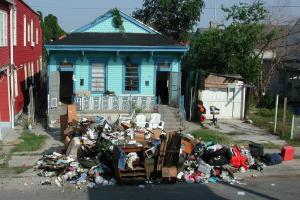
Early Christian moral teaching consistently warned Christians against the evils of avarice, understanding it was not only about the love of money, but the insatiable desire for possessions:
He [Abba Isidore of Pelusia] also said, ‘The desire for possessions is dangerous and terrible, knowing no satiety; it drives the soul which it controls to the heights of evil. Therefore let us drive it away vigorously from the beginning. For once it has become master it cannot be overcome.’[1]
As the love of money is the root of all evil, as avarice in all its guises keeps us away from the universal charity which we should possess, St. John Chrysostom declared that the summit of sin can be found in the desire for possessions. If we want to avoid evil, we must reorient our lives:
The very peak of evil, after all, and the summit (so to say) of sin is insatiable desire for possessions; if we were prepared to overcome it, there would be no obstacle to our escaping this obsession and then, by doing so, eradicating and expelling all deadly passions.[2]
The desire to possess things does not easily go away. Certainly, we do not overcome it simply by giving in to the desire and buying what we think will satisfy our craving. Avarice is like a hydra: the more we possess, the more things we desire to possess. Likewise, the more we possess, the more we will act in accordance to our possession: we will become, as it were, their slave, as we will do what we can to defend them from being taken away from us by others, no matter the cost. “The avaricious man loses this lifeblood, virtue, when he sets his heart on amassing riches.” [3] Other passions emerge from our desire to possess, from hatred and envy of those who have what we do not have, to anger at those who try to extract from us what we believe is ours by right, to sloth when we rely upon the greatness of our wealth to do for us what we should be doing for ourselves.
The glory and satisfaction gained by some increase of wealth is short-lived, and in times of trial. We will want more. But, as is with the way of all such fortune, instead of always being able to attain more, we find what we have can easily be lost. Moreover, sometimes, we realize how insignificant it all is. History shows that in times of trouble, such as famine, pestilence, or foreign invasion, many people quickly leave behind all that they took the time to accumulate. Fortunes come and go; sometimes, we learn out of necessity their empty nature, but we should not have to rely upon such trials to see through the charade. We should realize that the good which can be had in possessions, and to be sure, there is a good, is limited, and what we have beyond the measure of that goodness should be shared with others, so that no one is in need. That, moreover, is the greatest good which can be had with our possessions: sharing them with people in need, while if we fail to do that, we will receive the just payment for our sin:
The possession of present things has this great good, if it assists the life of the poor. Other than this, wealth is a temptation, and it will give greater punishments in the future to the extent that it is greater: “because severe judgment fall on those in high places” (Wis. 6:5).[4]
In the Apocalypse, therefore, we are warned that what we think is ours by right is not, and unless we are good stewards of the wealth which we have been given, using it to help the needy and the poor, we shall find ourselves spiritually needy and poor:
For you say, I am rich, I have prospered, and I need nothing; not knowing that you are wretched, pitiable, poor, blind, and naked. Therefore I counsel you to buy from me gold refined by fire, that you may be rich, and white garments to clothe you and to keep the shame of your nakedness from being seen, and salve to anoint your eyes, that you may see (Rev. 3:17-18 RSV).
Knowing the responsibility which comes with material wealth, many of the saints entirely gave it away; they knew it to be trouble. “For it is not the habit of the saints to rejoice over worldly riches.[5] Sadly, instead of realizing the implications of wealth, the responsibility which comes from it, Christians started to ignore the moral exhortations of the faith and to seek a life of wealth and luxury for themselves, doing what was shameful to gain their desires. The rebuke of St. Maximus of Turin is as relevant today, with refugees seeking asylum being rejected by the affluent the world over, as they were in his day:
Very many Christians not only do not distribute their own goods, but they even seize those of others. Not only, I say, do they not lay the money they have collected at the feet of the apostles, but they even drag their own brethren, who are seeking asylum, away from the feet of the bishops. Now is that time which the blessed Apostle describes when he says: In the last says the iniquity of many abounds and charity grows cold. For now the iniquity of avarice abounds, which are not a problem when there used to be the virtue of generosity, and fraternal charity grows cold, which used to burn with the love of Christ.[6]
Those Christians who would refuse the needs of refugees for the sake of their own inordinate gain show themselves far Christ, who came into the world to give the bounty of his grace to us all, poor and needy due to our spiritual poverty. He emptied himself of his glory to come to us in our inglorious condition so that we can be raised up from the status of spiritual refugee to a citizen of heaven. Those who follow Christ and share what bounty they have with others will be welcomed in glory: those who, however, think they can ignore the dictates of the Gospel and preserve their wealth at the expense of others will face the consequences of their actions.
Our modern consumeristic society has convinced many Christians to pursue wealth and all that it offers for themselves. They are led to consume the world and all its goods. They believe that those who have more proves themselves to be greater than those who have less. This position is the antithesis of the Christian understanding of wealth. It is no wonder, then, that so many who claim to be Christian, but have fallen to the lies of consumerism, likewise fall for other grave evils, such as racism, because once their heart is on mammon, the rest of the evils flows from their heart. Serving money, they can no longer serve Jesus as Lord, and so they will ignore his call to justice and charity, for such justice will get in the way of what they believe is the greater good, the good promoted by mammon. Truly, the words of Isidore of Pelusia have proven true: now that mammon reigns supreme in our society, its grasp is very hard, indeed, nearly impossible, to overcome.
[1] The Sayings of the Desert Fathers. trans. Benedicta Ward (Kalamazoo, MI: Cistercian Publications, 1984), 99.
[2] St. John Chrysostom. Homilies on Genesis 18-45. trans. Robert C. Hill (Washington, DC: Catholic University of America Press, 1990), 47.
[3] St. Anthony of Padua, Sermons for Sundays and Festivals. Volume I. trans. Paul Spilsbury (Padova: Edizioni Messaggero Padova, 2007), 43.
[4] St. Isidore of Seville, Sententiae. Trans. Thomas L. Knoebel (New York: Newman Press, 2018), 213.
[5] St. Cyril of Alexandria, Glaphyra on the Pentateuch. Volume I: Genesis. Trans. Nicholas P. Lunn (Washington, DC: CUA Press, 2018), 126.
[6] Saint Maximus of Turin, The Sermons of St. Maximus of Turin. trans. Boniface Ramsey, O.P. (New York: Newman Press, 1989), 43.
Stay in touch! Like A Little Bit of Nothing on Facebook.
If you liked what you read, please consider sharing it with your friends and family!













